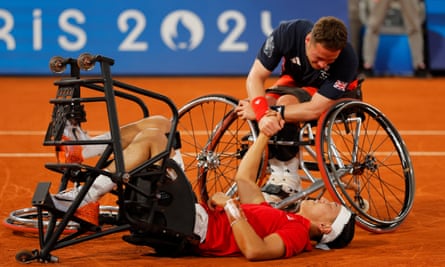Catherine Debrunner (para athletics)
The winner of five gold medals in Paris – plus a just-pipped silver in the 100m T53 – the irrepressible Debrunner was the most successful para athletics athlete of the Games. Her marathon medal on Sunday morning, up and down the cobbles of the Champs-Élysée, over the beautiful Pont Alexandre II and into Les Invalides, was the gold sprinkling on top of a haul that already included gold in the 400m T53, 800m T53, 1500m T54 and 5,000m T54 track. And it made it a Swiss wheelchair marathon double, with the unstoppable Marcel Hug winning the men’s race. “Winning this Paralympic marathon means all to me,” she said. “It’s [the marathon] something magical and ending the Games in this way is really something special.” Tanya Aldred
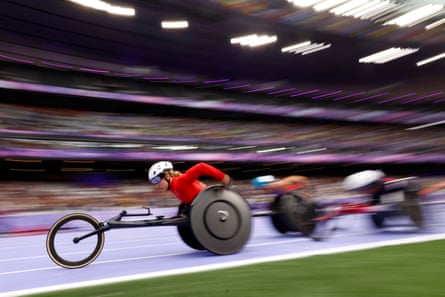
Gabriel Araújo (para swimming)
The Brazilian swimmer, also known as Gabrielzinho, has no arms and atrophied legs and essentially swims with his hips. At 1.2m tall, he is also a big character. Dominating his S2 classification by winning in 200m freestyle, 50m backstroke, and 100m backstroke, he delivered on his promise to the Brazilian president, Luiz Inácio Lula da Silva, that he would bring home three gold medals. He then went again, going up a classification to compete against less impaired athletes in the 150m individual medley SM3, and set a world record for SM2s in the process. After his defeated Neutral Paralympic Athlete (aka Russian) rival Vladimir Danilenko called him a “Rocketman”, Araújo accepted the moniker. “I hope to continue being the Rocketman,” he said. “And as they say, rockets don’t have wings, so let’s keep taking off.” Paul MacInnes
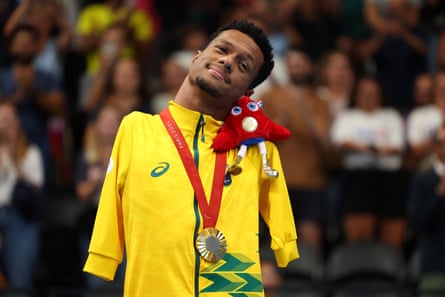
Ezra Frech (para athletics)
You might have thought he was destined for screen stardom, being the son of Hollywood actor Bahar Soomekh. But Frech, who was born without most of his left leg and missing fingers on his left hand, has gone in a different direction. The 19-year-old from Los Angeles was talented in a variety of sports from an early age and has gone on to be one of the top athletes with a prosthetic blade in the T63 category. In Paris he won his first Paralympic golds, in the 100m and high jump, and looks certain to be the face of the 2028 games in his hometown. But Frech isn’t just a star on the track. He has raised over $400,000 (£305,500) through his fundraising organisation, Team Ezra, and from a young age has given motivational speeches at schools to raise awareness around disabilities. Look out for him in four years’ time. Tom Jenkins
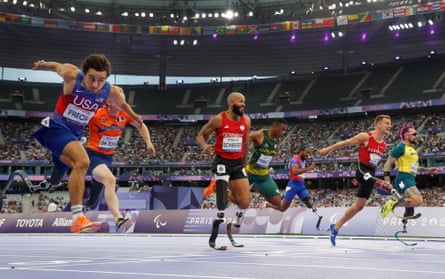
Lauren Rowles (para rowing)
Nobody has ever done what Britain’s Rowles achieved in the mixed PR2 double sculls this year; a third gold medal in rowing across three consecutive Games. But the 26-year-old is not only a phenomenal athlete, she’s a rock star too. Her mantra – that she competes to “really represent the people that look like me and love like me” – makes her a leading figure for both disabled and LGBTQ+ athletes. She speaks both eloquently and passionately and her smile has a sizeable wattage. That she also has the permed mullet that – believe it or not – is quite the look this summer, makes her an irresistible package. PM

Zakia Khudadadi (para taekwondo)
There is no greater story at the Paralympics than that of the Afghan taekwondo fighter who fought under the flag of the Refugee Team to claim their first ever Paralympic medal at the Games. Evacuated from Kabul in 2021 during the chaos of the American departure from the country and the return of the Taliban to power, Khudadadi travelled immediately to the Tokyo Games where she competed while she was essentially in shock. Having sought asylum in France she came back this year promising to make her mark and claimed bronze in the women’s K44 -47kg category. Not only a survivor she is an ambassador for a better world. “This medal is for all the women of Afghanistan and all the refugees of the world,” she said. “I hope that one day there will be peace in my country.” PM
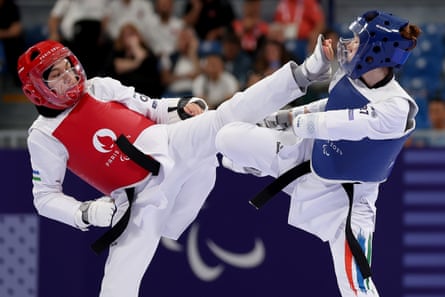
Aurélie Aubert (boccia)
Boccia isn’t normally seen as the one of the more high-profile Paralympic sports, often tucked away in a remote indoor location. But that changed on the day Aubert got gold for France in the BC1 category. Her winning smile lit up the Games and suddenly the 27-year-old with cerebral palsy was front-page news. She appeared on live late-night chat shows and was feted by thousands of adoring fans at Club France. Her impact on France was massive, so much so that she was chosen to carry the flag on her wheelchair at the closing ceremony and asked to blow out the flame. TJ
after newsletter promotion
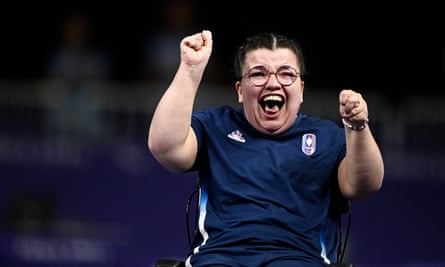
Sarah Adam (wheelchair rugby)
Wheelchair rugby is a unique sport in a number of ways and Adam a unique talent within it. Nominally a mixed sport, most teams comprise almost entirely of men. The logic is likely to do with strength and power, and the inclusion of women is incentivised by a classification boost that allows less impaired men to be included as compensation. There is no such quid pro quo required for Adam, who was a central part of the USA team that won silver in this year’s Games. More than capable of holding her own in the hurly-burly of Murderball, she also has game intelligence and athleticism greater than many of her peers. The Illinois native even played the sport before she was diagnosed with multiple sclerosis. She’s a standout talent in the sport. PM
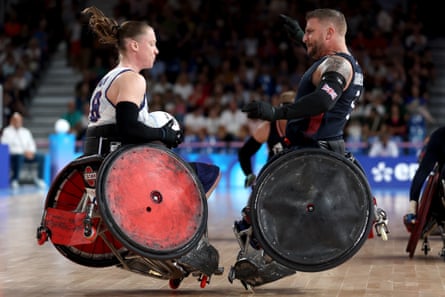
Bly Twomey (para table tennis)
It was only three and a bit years ago that Britain’s Twomey turned up at Brighton Table Tennis Club, on one of the Easter holiday activities and schools camps inspired by Marcus Rashford. Now, aged 14, she’s a double bronze Paralympic medallist – the youngest ever British para table tennis player and the youngest medallist in para table tennis history. Bly has cerebral palsy, but also plays able-bodied table tennis. “It’s unheard of,” says Tim Holtam, director of the Brighton club. “She’s a category seven athlete and there has never been a player in class seven involved in able-bodied table tennis – she’s No 2 in England in under-14s.” A shout out too for the club that nurtured her – an outstanding example of grassroots sporting inclusion. TA
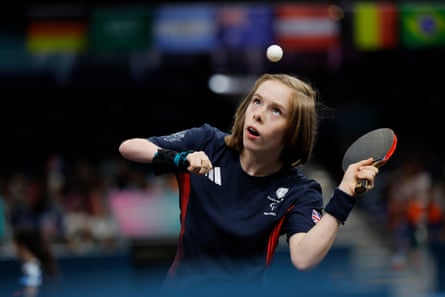
Brahim Guendouz (para canoe)
Out of the centre of Paris, on the waters of Vaires-sur-Marne, and on the penultimate day of the Games, a small tidal wave broke on the canoe lake. As he sprinted over the line, paddle flashing, Algeria’s Guendouz became the first African canoe Paralympic medallist – gold in the 200m KL3. Guendouz spent the early part of this year in Seville training with the Spanish para canoe team, after starting para canoe in 2017 and being talent spotted by the International Canoe Federation in 2019. He is the only para canoeist in Algeria. “It’s incredible to be honest and I know this medal will make a big jump in my country and Africa generally to develop our sport,” said Guendouz. “I know there is a lot of talented athletes right there, but they are waiting for the right moment and right opportunity.” TA

Alfie Hewett (wheelchair tennis)
The ridiculously talented star from Norfolk came to Paris missing one thing from his glittering career: a Paralympic gold. In the doubles final with partner Gordon Reid, the British pair played brilliantly to defeat their Japanese opponents 6-2, 6-1. The next day Hewett came back to Roland Garros to play his singles final against Tokito Oda. In the first game of the match he injured his groin and it looked like curtains. But the 26-year-old dug in and gradually worked his way back into the match. It made compelling viewing in front of a packed court. Oda just managed to get the victory and at the conclusion celebrated by whipping off both wheels and collapsing back first into the clay. Hewett, devastated by defeat, came round the net to congratulate the winner and help get his wheels back on to his chair. TJ
